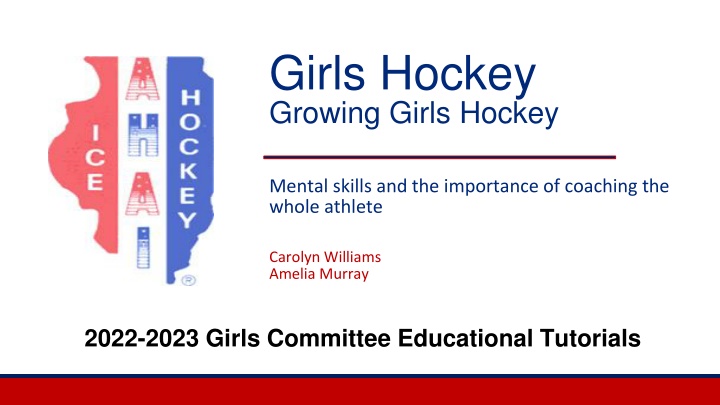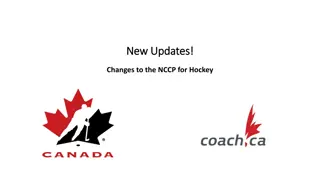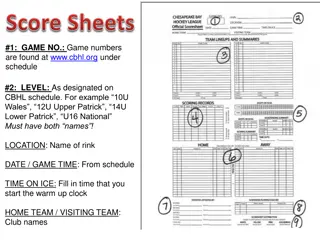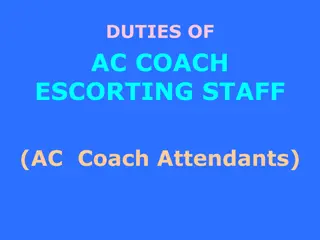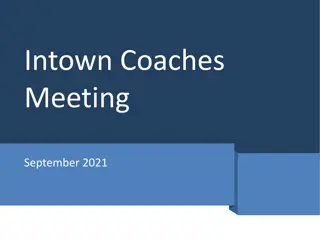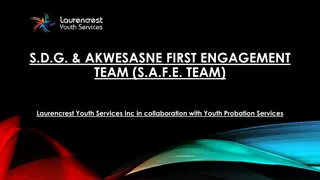Enhancing Mental Skills in Youth Hockey: A Guide for Coaches
Understanding mental skills, mental toughness, self-talk, and handling negative self-talk are crucial aspects of youth hockey coaching. Teaching these skills can improve athletes' performance and resilience, helping them navigate challenges and setbacks effectively. Coaches play a vital role in incorporating mental skills training into their coaching approach to support the holistic development of young hockey players.
Download Presentation

Please find below an Image/Link to download the presentation.
The content on the website is provided AS IS for your information and personal use only. It may not be sold, licensed, or shared on other websites without obtaining consent from the author.If you encounter any issues during the download, it is possible that the publisher has removed the file from their server.
You are allowed to download the files provided on this website for personal or commercial use, subject to the condition that they are used lawfully. All files are the property of their respective owners.
The content on the website is provided AS IS for your information and personal use only. It may not be sold, licensed, or shared on other websites without obtaining consent from the author.
E N D
Presentation Transcript
Girls Hockey Growing Girls Hockey Mental skills and the importance of coaching the whole athlete Carolyn Williams Amelia Murray 2022-2023 Girls Committee Educational Tutorials
What are mental skills? Whether it is handling a tough loss, experiencing a big win, dealing with an injury, or learning how to bring confidence to your game, mental skills are tools that can be used by everyone to improve performance. Teaching mental skills to athletes is not therapy, nor should be seen as a solution to personal athlete challenges. If an athlete presents mental health concerns or demonstrates a potentially unhealthy change in behavior, please contact authorities and follow the appropriate steps to report. Coaches have a lot on their plate when it comes to leading their athletes through a season. The following slides contain information and suggestions for including mental skills at a reasonable level within your standard youth hockey experience.
Understanding mental toughness Mental toughness is an athlete s resilience when coping with the demands of their environment. Mental toughness centers around four C s : Challenge: The ability to view obstacles and adversity as opportunities for growth. Control: The ability to focus on what is within your control. Commitment: The ability to have total involvement and persistence in your goals. Confidence: The ability to believe in yourself! For your athletes: Everything the mind says, the body hears. Next time you are faced with a challenge, try telling yourself the ways you can succeed instead of what might go wrong!
Self-talk Self-talk is the little voice you hear inside your head. Everyone has self-talk, and it is happening all the time, even when you don t realize it! There are three main types of self-talk: Type: Examples: I am good enough! Let s take a chance, I believe in myself Positive Self-Talk Negative Self-Talk This is pointless, I can t do it There s no way this will work Neutral Self-Talk Professional athletes make mistakes too I m not feeling confident right now, but I ll try my best today
Focusing on negative self-talk Negative self-talk can hurt performance. When athletes focus on the negative parts of their performance, it can be difficult to see past mistakes. Although it is important to learn from mistakes, fixating on them can prevent athletes from playing in the moment. Learning how to recognize and stop negative self-talk is one of the most important pieces of mental toughness. Here are three steps for handling negative self-talk: 1. Catch the negatives: recognize when negative self-talk occurs for you, or what might cause it to happen. 2. Think it out: what are you really frustrated about when you express negative self-talk? It is realistic 3. Change the negative to neutral: try to avoid using absolute words. For example, instead of I m never going to get this , think I didn t get it this time, but I am going to keep trying . For your athletes: When in doubt, talk to yourself like you would talk to a friend!
Goal-Setting Outcome Goals: Outcome goals are the singular goal you are working towards, often a team goal. Examples include: winning a tournament or making the state playoffs. Performance Goals: Performance goals lead to outcome goals and are based on personal standards. Examples include: achieving a certain faceoff percentage or scoring a specific number of points each month. Why is goal setting important? Goals help our athletes focus on more than just a win/loss record. Challenging yet attainable goals can increase intrinsic motivation and help athletes develop confidence. Process Goals: Process goals are the stepping stones to your performance goals. They are specific actions that are 100% in your control. Examples include: shooting 50 pucks every night or working out twice a week.
Confidence Confidence is what turns our thoughts into actions. It is the belief in your ability to get stuff done! Confident athletes experience fewer self-doubts and worries, have higher intrinsic motivation, higher concentration, and are more determined to work hard. Confidence can be visualized on a continuum, ranging from low confidence to optimal confidence to overconfidence. Confidence is most affected by three factors: 1. Consistency: Provide your athletes with lots of opportunities to practice a skill or task. 2. Recency: Use recent examples of success to help bolster athlete confidence. 3. Quality: Confidence grows faster when athletes accomplish or master more challenging tasks. Using goal-setting is a great way to support this. Optimal confidence is built by preparation and competence. As a coach, it is your job to help athletes acquire the knowledge, skills, and strategies to compete. Confidence isn t always verbal. Remember, body language and facial expressions are just as important!
An athletes perspective I attended Union College in upstate New York, and was a member of their Division I Women s Hockey team. Our group was fortunate enough to have a trained Sports Psychologist available to us throughout the entirety of our college experience. We attended team meetings with him once a month, where we set our focus on working towards developing better mindset skills, recovery skills, and team cohesion. Personally, I met with our Sports Psychologist once or twice a week in season, as well as every few weeks out of season. As all athletes have entirely different experiences, he would tailor our individual sessions to what each player felt was most needed. Our time together was mostly centered around confidence building and the importance of mindfulness played in my game. I firmly believe that the commitment to training mental skills, principles, and tools on a consistent basis shaped my experience as a college hockey player for the better. Amelia Murray Union College
AHAI Girls Committee Thank you!
